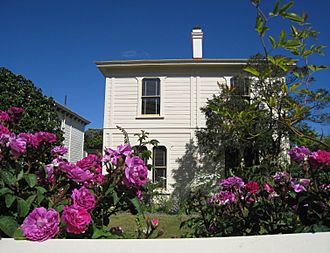Katherine Mansfield House and Garden facts for kids
Quick facts for kids Katherine Mansfield House and Garden |
|
|---|---|

Katherine Mansfield House and Garden in Thorndon, Wellington
|
|
| General information | |
| Architectural style | Italianate |
| Town or city | 25 Tinakori Road, Wellington (number 11 before 1908) |
| Country | New Zealand |
| Coordinates | 41°16′13″S 174°46′48″E / 41.270164°S 174.77992°E |
| Construction started | 1887 |
| Cost | £400 |
| Client | Harold Beauchamp |
| Designated: | 11-Jul-1986 |
| Reference #: | 4428 |
The Katherine Mansfield House and Garden is a special place. It was the childhood home of Katherine Mansfield, a famous writer from New Zealand. This historic house is in Thorndon, Wellington. It's so important that Heritage New Zealand calls it a 'Category 1 Historic Place'.
Contents
Building Katherine's Childhood Home
The house was built in 1888 for Katherine's father, Harold Beauchamp. It was built during a time when money was tight for many people. The land was rented, and the rules said any house built there had to be worth more than £400.
The house has two floors. It is about 9 meters wide and 12 meters long. Downstairs, there is a living room, a dining room, a bathroom, a kitchen, and a small washroom. Upstairs, there are four bedrooms and a special room for babies or young children.
The original wallpaper and old dishes found show that Katherine's mother liked the 'aesthetic movement'. This was a style from Europe that focused on beauty in art and design.
A Look at Its History
Katherine Mansfield's family moved into the house in 1888. Katherine was born there a few months later, on October 14. Many people lived in the house at first. This included her parents, her two sisters, two aunts, her grandmother, and a servant. It was a very full house!
Sadly, Katherine's baby sister, Gwendoline, died in 1891. Many people in Wellington got sick from diseases like typhoid back then. This was because the city's sewage system was not very good.
In 1893, the Beauchamp family moved to a bigger house in Karori. Katherine's father said they moved for everyone's health. They moved back to Thorndon in 1898 and then to other homes in Wellington over the years.
Katherine Mansfield used her memories of this house in her stories. Some of these include "Prelude", "A Birthday", "The Doll's House", and "The Wind Blows". She once described the house as a "dark little cubby hole" and a "horrid little piggy house".
Other Families Who Lived Here
Katherine's father owned the house until 1929. Many different families lived there over the years. One important person was Dr. Frederick Truby King. He started the Plunket Society, which helps mothers and babies. Dr. King lived in the house from 1921 to 1924. During this time, he became the Director of Child Welfare for New Zealand.
The house was later sold to Edward Pearce. In the 1950s, plans for State Highway 1 meant a big trench was built under the back of the house. This made the area look a bit run-down.
The Katherine Mansfield Birthplace Society
In 1986, a group called the Katherine Mansfield Birthplace Society was formed. They bought the house in 1987. The society worked hard to bring the house back to how it looked when Katherine lived there. They used Katherine's own descriptions, old photos, and expert studies to help.
Today, the house and its garden are open to everyone. Visitors can explore and learn about Katherine Mansfield's early life.
 | Sharif Bey |
 | Hale Woodruff |
 | Richmond Barthé |
 | Purvis Young |

